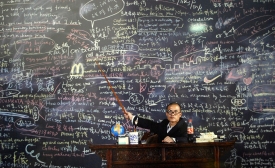hard power
China has been making major efforts to increase its ability to influence other countries without force or coercion. [...] China has emphasized its cultural and economic strengths, but it has paid less attention to the political aspects that can undermine its efforts.
First introduced by then-Vice President Xi during a state visit in 2012, the NTGPR framework has since come to dominate Chinese public diplomacy towards the United States. Like the “China Dream” and “One Belt, One Road,” the “new model” of Sino-American relations occupies an important ideological space for the Party’s 5th generation leadership.
The defence secretary has defended the government’s military strategy and spending, saying that “no country in Europe is playing such a strong global role”. Writing in the Sunday Telegraph he said the UK was “in it for the long term” when it came to Nato and deterring Russia, also hailing British operations against Islamic State (Isis) and humanitarian missions. [...] In his Telegraph article, Fallon highlighted the role of soft power in tackling the causes of instability, while also highlighting areas of military spending, including aircraft carriers and submarines.

This journal article by Zhao Kejin examines China's public diplomacy strategies, campaigns and global motivations to strengthen and secure its international public image.
Many in the country and across the globe believe that the US is slipping away from being the world's most powerful nation. [...] He (Joseph Nye) corroborates his arguments with facts and figures on the indices of America's favourable geography, demographics, military power and soft power, purchasing power parity and science and innovation.
After four years of engagement with its critics in a so far failed bid to turn its hosting of the World Cup into a successful soft power tool, Qatar appears to have decided that the region's tendency to intimidate those who don't fall into line may be a more effective strategy, writes James M. Dorsey.
Indian Prime Minister Narendra Modi will soon be completing his first full year in office. While he has his critics, there tends to be broad agreement that Modi has done a robust job in the sphere of foreign policy. Modi’s approach has focused on economics, soft power, connectivity, and maritime security. Modi has been deft at using what Joseph Nye has dubbed “smart power” – the right blend of soft power and hard power.
Russia’s image in the Middle East is that of a tough state with a rigid authoritative political rule and an inclination toward hard power in its foreign policy. Indeed, Moscow’s support for some regional hard-liners and opposition to others, as well as its stance as one of the largest arms suppliers to the Middle East, are all grounds for this perception in the region. Although recently Russians have started to pay more attention to its soft power projection in different parts of the world, Moscow has a long way to go to make itself look more attractive on this front.







